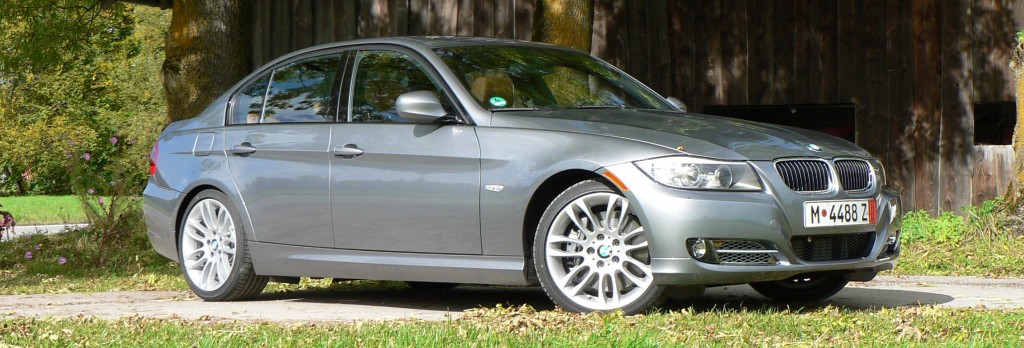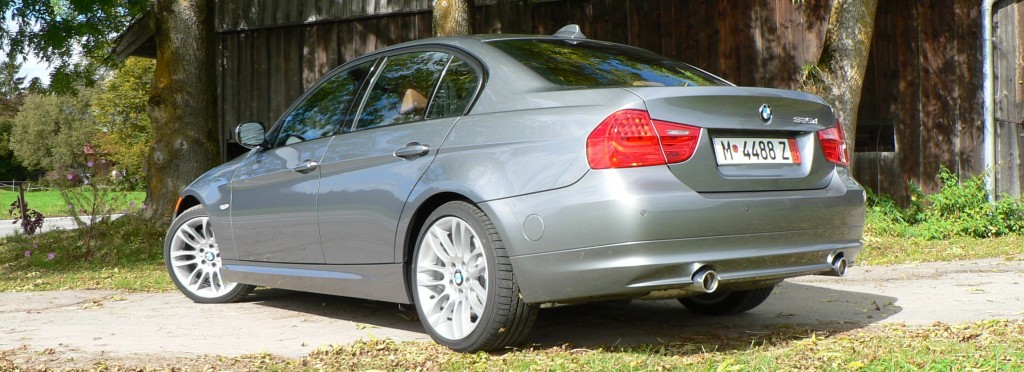First Drive: 2009 BMW 335d
Story and photos by John LeBlanc
MUNICH–If you’re a fan of fast, fine-driving, yet frugal automobiles, you should be thanking 19th-century German chemist Friedrich Wohler, best-known for his artificial synthesis of urea without the use of kidneys from man or dog.
Urea, naturally found in mammalian and amphibian urine, as well as in some fish, is apparently highly soluble in water. In humans, so I’m told, it helps expel excess nitrogen.
In cars, though, it helps expel nasty nitrogen-oxide content from the exhaust of diesel engines. And Wohler’s best work is only one of the tricks that has allowed BMW to meet stringent California emissions laws and return to the North American market with its first diesel since the 524td from the early 1980s.
Now, BMW is giving its 3 Series sedan and wagon a mid-cycle touchup for the 2009 model year, including new exterior designs, a “higher quality” interior, updated iDrive central controller, enhanced AWD systems and slightly wider wheel tracks.
(The coupes and convertibles virtually carry over from last year’s models.)
But the reason we’re in Munich on the last weekend of Oktoberfest is the new 335d. That’s “d” as in “diesel,” folks.
As you may know, Europeans have been suffering from high fuel prices a lot longer than Canadians. For example, Müncheners pay about $2.18 a litre – gas or diesel.
Therefore, to say diesels are popular in Europe is an understatement, given that they are generally about 25 per cent more fuel efficient than a comparable gas model. BMW says more than 71 per cent of its European new-car sales are now diesels. Except for its Z4 sports car, diesels are available in every model range, including the Mini D.
Historically, diesels have been seen as slow, lazy, dirty and noisy in the U.S., said Klaus Borgmann, BMW’s director of the 3 Series. Although Canadians have been more appreciative of diesel’s virtues (witness Volkswagen and Mercedes-Benz’s sales successes), the American market, which is 10 times larger, has a big say as to what products we get. So why does BMW think Americans (and Canadians) are ready to try a diesel again?
High fuel prices, environmental concerns, the North American introduction of low-sulphur diesel fuel and an unsure belief in the value of gasoline-electric hybrids are the main reasons.
As with the 323i, 328i and 335i gas models, the 335d’s engine is an inline six-cylinder. But the diesel mill is matched to a mandatory six-speed automatic you can shift for yourself with paddle shifters, while putting power to the rear wheels only, as AWD is not available.
The new diesel engine’s 3.0 litres of displacement is aided by two turbochargers – one small turbo blows at low rpms, and a bigger turbo puffs at higher rpms. Borgmann says the diesel 3’s performance-versus-economy advantage over a hybrid stems from the twin turbos always working together.
Compared to the $48,900 335i, the “d” has 35 less horsepower (265), yet a tree-stump-pulling 425 lb.-ft. of torque –125 more than the “i”.
So does a diesel BMW still drive, well, you know, like a BMW?
In use, the two-stage turbo system provides zero turbo lag, perception-crushing acceleration and surreal fuel economy.
And so much for the talk of diesels being slow.
Factory numbers say the diesel is only a half-second behind the gas 335i from 0-to-100 km/h at 6.3 seconds. Yet it betters its combined fuel consumption rating on the EU cycle at 7.1 l/100 km, versus 10.3 for the gas version.
Thankfully, the rest of the 335d drives like a 3 Series. Along for the ride are communicative steering, a nice balance of ride and handling, a great driver’s environment and generous brakes (helpful when dealing with left-lane wanderers doing 240 km/h on the autobahn – trust me).
In other words, the 3 diesel continues as one of the best all-around sports sedans in its class. But with one-third better fuel economy.
About the only thing missing from the normal 3 Series driving experience is the aural symphony normally heard when a BMW straight-six is on the boil. Instead, the 335d’s exhaust is more of a baritone with a bad head cold.
At least the traditional diesel clatter has been all but banished in the new 335d.
Canadian pricing for the 2009 BMW 335d hasn’t been released yet. My guess is about a $2,500 premium over a comparably equipped 335i gas model, or around $55,000 when it goes on sale this December.
As one of only three new diesel passenger cars available on the Canadian market, the BMW is the Mama Bear to the Papa Bear $68,100 Mercedes-Benz E 320 BlueTec, and the Baby Bear $24,275 Volkswagen Jetta TDI.
In the entry-level luxury sedan segment, however, its list of rivals is short: There are none.
As European customers have indicated with their wallets, except for the lack of high-revving straight six and a manual transmission, there are no tangible differences between driving a diesel and a comparable gas model 3 Series.
2009 BMW 335d
PRICE: (est.) $55,000
ENGINE: 3.0 L turbocharged I6
POWER/TORQUE: 265 hp/425 lb.-ft.
FUEL CONSUMPTION: City 8.5 L; hwy. 5.5 L; combined 7.1 L/100 km
COMPETITION: Mercedes-Benz E 320 BlueTec; VW Jetta TDI (sort of)
WHAT’S BEST: Negligible performance loss, significant fuel economy gain
WHAT’S WORST: Additional ownership costs, explaining the urea tank to your neighbours
WHAT’S INTERESTING: A BMW 320d racecar became the first diesel model to win the 24 Hours of Nurburgring in 1998.







![[del.icio.us]](https://www.straight-six.com/wp-content/plugins/bookmarkify/delicious.png)
![[Digg]](https://www.straight-six.com/wp-content/plugins/bookmarkify/digg.png)
![[Facebook]](https://www.straight-six.com/wp-content/plugins/bookmarkify/facebook.png)
![[Google]](https://www.straight-six.com/wp-content/plugins/bookmarkify/google.png)
![[Reddit]](https://www.straight-six.com/wp-content/plugins/bookmarkify/reddit.png)
![[StumbleUpon]](https://www.straight-six.com/wp-content/plugins/bookmarkify/stumbleupon.png)
![[Twitter]](https://www.straight-six.com/wp-content/plugins/bookmarkify/twitter.png)
![[Email]](https://www.straight-six.com/wp-content/plugins/bookmarkify/email.png)